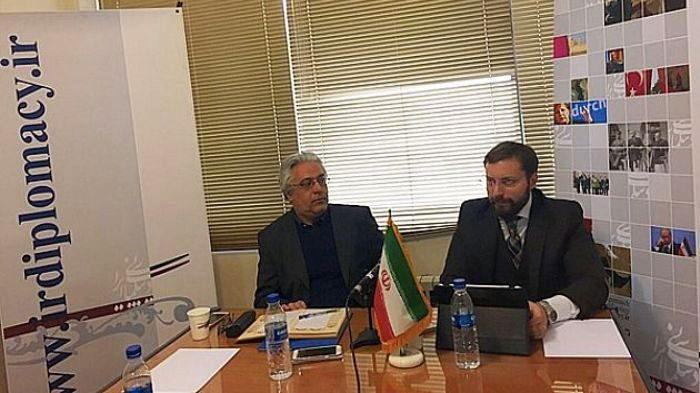JCPOA, the Road Map for Iran-EU Relations
Proceedings of the IRD panel on Tehran-Brussels relations in the post-JCPOA era.

On Wednesday, February 03, 2016, Iranian Diplomacy was host to the panel “Iran-EU relations in the post-JCPOA era”, where Tehran University lecturer Saeed Khaloozadeh and Tehran-based Italian scholar Raphael Morillo spoke on the prospects of relations between Tehran and Brussels after the nuclear agreement. Excerpts of their talks come in the following.
Raphel Morillo
- During Ahmadinejad’s presidency, Iran-EU relations were influenced by US policies (towards Iran).
- The EU has no official mission in Iran. In Federica Mogherini’s trip to Iran, the opening of a bureau for the EU mission to Iran will be discussed.
- The EU’s Iran policy has been focused on security affairs. The policy needs to extend beyond security issues and into economic relations.
- The EU is a buyer of energy from both Iran and Russia. These two countries are in competition in Europe.
- The European Union is fully prepared to collaborate with Iran. We can expect that Iran supplies the EU’s needs for gas after the Ukraine crisis has come to a conclusion.
- Brussels can collaborate with Iran on the issues of clean energy and tackling environmental problems.
- Iran’s non-membership in the WTO is an obstacle against economic ties. Tehran should attempt to join the organization. It can pave the way for membership through establishment of preferential economic ties with the European Union.
- For European tourists, traveling to Iran is costly. Lack of accommodation for foreign tourists is a serious problem. That is why the number of European tourists, most of which are Italian, is so low.
- Another field of cooperation between Iran and the EU is battling against transit of drugs from Afghanistan into Europe. Cooperation in this area should expand.
- In 2013, in every ten Europeans, eight had a negative view towards Iran.
- Difficulties between Iran and the EU over human rights still persist.
- [Close] relations between the EU and the United States do not mean EU dependence, but it indicates the interests that lie in collaboration with the US.
- In terms of democracy, Iran is not comparable to other countries in the region. However, the European Union’s relations with Iran are independent from its relations with Saudi Arabia and other countries. One cannot claim that Europeans ignore human rights issues in Saudi Arabia. For the EU, human rights violations in Saudi Arabia are also important.
- The EU’s viewpoint about the state of human rights in Iran is not based on objective realities.
Saeed Khaloozadeh
- More than 85 percent of Iran’s energy exports headed for European countries, but sanctions stopped this trend. Iran’s economic exchanges with the EU were worth 30 billion dollars which fell to 6.5 billion dollars [after the sanctions].
- Implementation of the JCPOA is a turning point in Iran-EU relations. Rouhani’s trip to Europe ten days after the enactment of the Joint Comprehensive Plan of Action is significant.
- Expansion of ties between Iran and the EU will reinforce the regional state of both parties.
- The Shia Iran is closer to the Christian Europe than the Sunni Arab World. In this regard, Rouhani’s visit with Pope Francis was important.
- Europeans did not wait for the Implementation Day. In the last two years, more than 100 European trade delegations have visited Iran.
- Despite the United States’ key role, we should not forget the influence of the EU. Catherine Ashton, the former EU foreign policy chief, was in charge of coordinating nuclear talks, and Federica Mogherini followed the line.
- Europeans convinced Washington to solve the diplomatic challenge with Iran through negotiations. They suggested implementation of soft diplomacy.
- The Joint Comprehensive Plan of Action is the road map for Iran-EU relations.
- Human rights is an issue for the EU in its relations with other countries. However, even a country like France prioritizes its economic interests over human rights in relations with China. The volume of trade between China and the European Union is 460 billion dollars.
- Europeans believe that reinforcement of economic relations with other countries will lead to improvement of the state of human rights.
IRD/66

